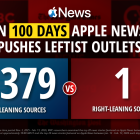
The FCC made a massive power grab on Nov. 16 when it voted to adopt rules that would effectively manage the minute details of how internet service providers operate. In exclusive comments with MRC Free Speech America Friday, Carr described his dissent and why he is so concerned by the FCC’s new rules for the internet. “It’s just all about control,” he said. “The government is going to have the veto power for the first time ever over the very Internet infrastructure itself and I think that’s concerning. We need to be in a world in which the internet infrastructure itself is effectively cancel-proof when it comes to the federal government.”
Carr stressed that the level of control the federal government is exercising is “unprecedented.” He explained, “Before now, the government wasn’t in a position to dictate to your local [Internet service provider] where they should build internet infrastructure; on what terms they should build internet infrastructure; who they can serve; who they can’t serve. Those were all things that were, up to now, were essentially beyond the reach of the government itself.”
In his dissenting statement, Carr explained the Diversity Equity and Inclusion (DEI) flair to the recent FCC rule “digital equity” developments. “Even in the absence of any evidence of intentional discrimination, the Biden plan states the FCC can impose potentially unbounded liability if the agency finds that some act or even failure to act happened to result in a disparate impact based on the FCC’s own judgment,” Carr wrote. He gave the examples of the FCC potentially prohibiting companies from “charging a uniform price to all consumers or running credit checks because those actions would necessarily have a disparate impact on low-income consumers.”
Well, surprise, surprise.
— Brendan Carr (@BrendanCarrFCC) November 17, 2023
In a last minute edit, the Biden Administration secured an exemption from the government’s new “digital equity” rule for . . . itself.
That’s right. The Biden Administration does not want to be bound by the requirements of the “digital equity” law… pic.twitter.com/MYTFmpxQty
Although it isn’t immediately clear whether the rules could be weaponized against free speech, Carr warned about the dangers of allowing government overreach. “Once the government has a power, there’s very few if any cases that the government does not use and then at some point abuse that power,” he added. “I think we would be far better off from an individual liberty perspective if the government did not have the power that it has given itself.” He referred to the fact the decision will allow the FCC to regulate internet speeds and where internet infrastructure can and cannot be built.
Despite the disturbing power grab, Carr was optimistic about the future of these rules noting that the FCC decided to “delay the enforcement of some of the more pernicious aspects of this decision for six months.” He added that the decision may even be appealed in court. “I am hoping that some of the most overreaching elements of this can be paired back by courts before it even goes into effect,” said Carr.
Conservatives are under attack. Contact your representatives and demand that Big Tech be held to account to mirror the First Amendment while providing transparency, clarity on hate speech and equal footing for conservatives. If you have been censored, contact us using CensorTrack’s contact form, and help us hold Big Tech accountable.









